THE D-DAY CODE WORD MYSTERY
Written by Rick Archer
February 2019
|
Rick
Archer’s Note: Here is a
tale about D-Day that is certain to make you
shake your head in amazement.
This is
the
true story of how a crossword puzzle scared the
absolute wits out of the Allied Supreme Command
shortly before D-Day. This is
definitely one of those “Ripley Believe it or
Not” kind of stories. You
will be astonished at the explanation.
|
DIEPPE
We begin our story with a place
called Dieppe. Have you
ever heard of Dieppe? Unless
you are French, Belgian or
a military buff, probably not.
As you will see, "Dieppe"
played a major role in the D-Day Code Word mystery.
DIEPPE
was the place where a disastrous British raid
involving 6,000 men took place on 19 August 1942.
The raid
was meant to be an exploratory attack,
a kind of
fact-finding mission. The objectives included
seizing and holding a major port for a short
period. The strategists wanted to gather
intelligence about German
defenses. They also wanted to prove that it was
possible to assault a place like this successfully.
The
British and Canadians had
no plans to stick around.
All they wanted was do a
little damage, then get out of there. Upon retreat,
the Allies intended to destroy
some coastal defenses,
port structures and any strategic buildings.
The raid
had the added objective to boost morale and
demonstrate the firm commitment of the United
Kingdom to eventually open a western front in
Europe.
|
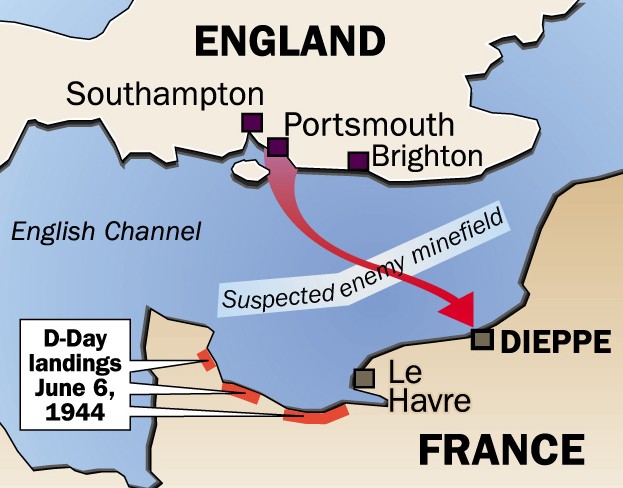 |
All
very noble
ideas. Only one
problem - none of these objectives were
met. The raid failed
miserably. Allied
fire support was grossly inadequate and the raiding
force was largely trapped on the beach by obstacles
and German fire.
The battle ended about 10 hours
after the first landing.
Anyone who could still walk joined the evacuation.
There were over 3,000
casualties. Many others were taken as
prisoners of war.
Given that more than
half the men were dead,
the bloody fiasco was
depressing as hell. It told the world that
the Allies could not hope to invade France for a
long time. Understandably, in Great Britain
the word 'DIEPPE'
became synonymous with
failure. It was a sensitive word
indeed. Not
only that, the readiness of the defense made it seem
like the Germans knew they were coming.
So
imagine how MI5, the British spy
agency felt when someone pointed out
the word
"DIEPPE" had appeared a
couple days earlier in a
London Daily Telegraph crossword
puzzle on August 17th,
1942.
Suspicious. Very
suspicious indeed.
|
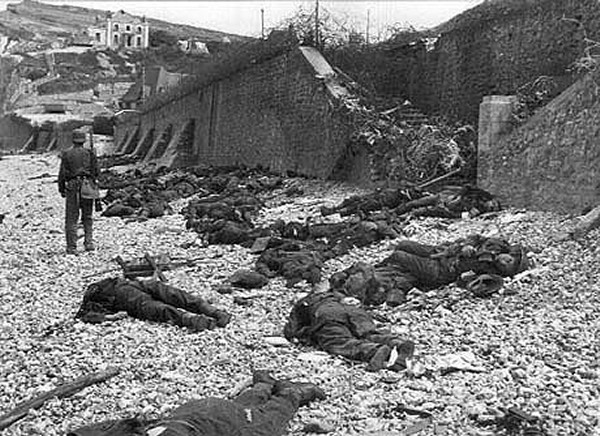 |
Ordinarily
no one would give a word like
DIEPPE a second thought.
Except for one
thing… the clue had appeared in the
London
newspaper just two
days before the disastrous
raid.
August 17: Crossword puzzle using 'DIEPPE' is published.
August 18: 'DIEPPE' appears in the Answer Section for
the previous day's crossword.
August 19: Raid on Dieppe fails
miserably, 3,000 lives are lost.
This was one heck of an ominous
coincidence. To the naked eye, it looked like a Nazi spy based in London had found an
ingenious way to tip off the Germans of the location of the
impending attack on Dieppe. Given the fact that the Germans seemed to be
laying in wait strongly reinforced that suspicion.
Indeed, the Germans seemed to
have been practically waiting at the
shoreline for the British to arrive on
their doorstep.
Had the crossword clue tipped them off?
Experienced Crossword Puzzle solvers
will confirm that 'DIEPPE'
is an unusually obscure clue.
Britain's spy service, MI5, agreed.
The
appearance of DIEPPE seemed
quite sinister. But how to explain the appearance of a one in a million clue in
the London newspaper
just two days
before the attack?
An investigation was
launched. Lord
Tweedsmuir was assigned to ask questions about the
appearance of DIEPPE as a Telegraph crossword clue
answer on August 17. At that time Tweedsmuir was a senior
intelligence officer attached to the Canadian Army, which
had made up the main assault force for the disastrous DIEPPE
venture. Tweedsmuir knew several of
the men who had died in the raid and was determined to get
to the bottom. Upset at
the thought that
a spy might have
revealed their mission to the enemy,
Tweedsmuir was relentless.
But he found nothing...
Later Tweedsmuir
commented:
"We noticed the crossword contained
the word DIEPPE. There was an immediate and
exhaustive inquiry which also involved MI5.
In the end
it was concluded that it was just a remarkable coincidence -
a complete fluke."
|
HISTORY REPEATS ITSELF ON THE EVE OF D-DAY
Although the Dieppe
coincidence was written off as a complete fluke, there was a
serious development in the months leading up to D-Day that
was highly reminiscent of the Dieppe tragedy. Two years
after the Dieppe coincidence, a series of
8 different secret
code names vital to the invasion appeared
in the London Daily Telegraph. The first three clues
appeared in April, but the next 5 appeared in May right on
the eve of the June 6th D-Day attack. To the
disbelieving eyes of the men entrusted with protecting the
secret location of the Normandy invasion, history seemed to
repeat itself. The thought that the Normandy invasion
was doomed just like Dieppe had been made everyone sick in
their stomach with worry.
Order of Appearance
•
Juno
•
Gold
•
Sword
•
Utah
•
Omaha
•
Overlord
•
Mulberry
•
Neptune
Fluke? Coincidence?
Uncanny precognition? Or German spy? What
could possibly be the explanation? The spy masters
feared the worst.
|
Given
the context of the strange DIEPPE incident two years earlier,
it sure seemed like someone was indicating the invasion was
headed to a place codenamed Juno, Gold,
Sword, Utah, and Omaha.
Did
the Germans understand the
significance of those five words?
If so, they had just been warned exactly
where the Allies were headed on D-Day. To the
worrywarts at MI5, it sure looked like the invasion was
headed into another Dieppe-style fiasco. If so, the
results would be horrifying beyond imagination.
This time there could be no coincidence. The
odds of 8 different ultra-secret clues appearing in the
London Daily Telegraph
crossword were too remote to be dismissed as a "fluke".
There had to be a significant connection of some sort.
|
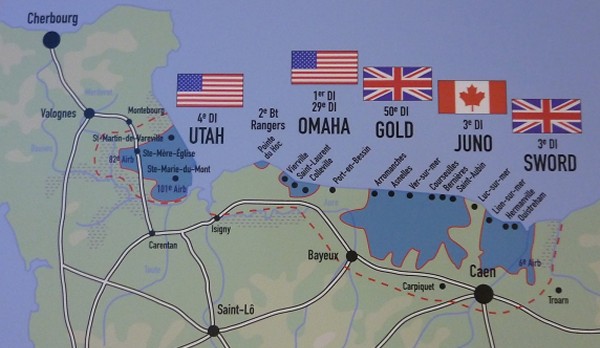 |
Let's
pretend you
are one of those people who has been
entrusted with the task of protecting the secret of the Normandy
Landing. You are determined to keep
the choice of Normandy a surprise lest the Nazis triple
their defenses at the last moment.
How do you
suppose you would react if you started to see the
code names of those beaches
appear in the daily crossword puzzle just days before the
launch? You would probably go nuts.
Well, that’s
exactly what happened in 1944. And
people did go nuts!
The people in British Intelligence
flipped their wigs when the code names for the D-Day Landing
Beaches began to show up in the London daily crossword just
2 months before the fateful day was to take place.
The crossword
craziness started in April 1944, a month
and a half before D-Day took place.
On different days in April 1944, the solution words
Juno, Gold and
Sword had appeared in the London Daily Telegraph
crossword puzzle. And then at the start
of May, UTAH joined the parade. D-Day was just
one month away.
Great Britain’s
MI5 was made famous by Ian Fleming in his James Bond books.
MI5 is the British counterpart to our own CIA spy agency.
This institution was in charge of protecting the Normandy secret. Not
surprisingly, there were many men and women in MI5 who were
also avid crossword puzzle fans.
The buzz in the agency
over the mysterious appearance of these words was growing.
It seemed
ridiculous that a daily crossword puzzle was being used to
communicate top-secret information, but with the odds so astronomical, some very keen minds were
at a total loss to find a logical explanation for the weirdness of
it all.
|
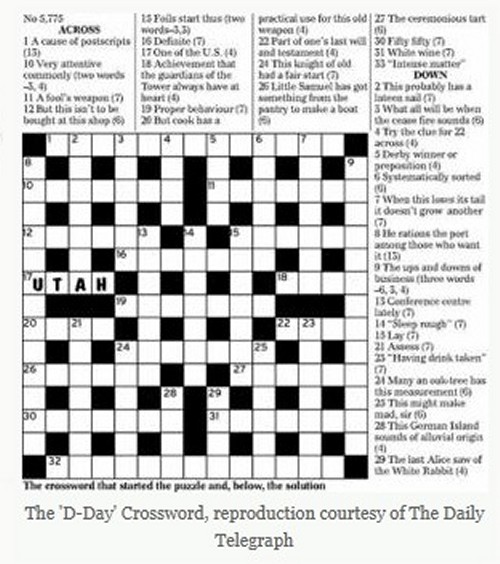 |
Was
this just a silly coincidence? Or
was this the work
of a German spy sending covert messages to the homeland?
Were the clues limited to the Daily
Telegraph? Perhaps other valuable clues were appearing
elsewhere in another section or another newspaper.
Every morning
practically every member
of MI5 began to turn immediately
to the morning London Daily Telegraph crossword puzzle!
Omaha Beach
The moment they opened the paper on May 22, 1944, the spy people
lost their breakfast.
They stared grim-faced at the newest
crossword puzzle. There it was,
OMAHA, the word they had been looking for. Now
all five beaches had made it into the puzzle.
The
clue was
"Red Indian on the Missouri River", 5 letters.
The solution? The
Omaha Indians began as a woodland
tribe in Ohio. After migration, the
tribe settled near the Missouri River in what is now
northwestern Iowa. A seemingly
harmless clue except for one thing.
Omaha was the codename for the D-Day beach scheduled to be taken
by the 1st US Assault Division in just a matter of days.
What was going on here?
Making matters worse, the problem
didn't stop with the beaches!
Five days later,
Saturday, May
27, this time it was
Overlord that appeared. The agents stared in amazement.
OVERLORD was the
codename for the entire D-Day operation!
This was the sixth top-secret word to appear.
|
To the
consternation of the agents,
three days later on May 30, another word
appeared. This time it was “MULBERRY”.
MULBERRY was codename for the
pre-fabricated floating harbors used in the
D-Day landings. This marked the 7th
appearance of an ultra-secret code name in the daily
crossword puzzle. Everyone
was tearing their hair out at this point.
The straw
that broke the camel’s back came two days later. On
June 1, just five days prior to
the invasion, the solution to 15 Down was
Neptune. This
was the codeword for the naval assault phase of D-Day.
This
marked the 8th D-Day clue that had no
business appearing in a public forum. No one knew
for sure when D-Day was coming, but everyone knew it
was imminent. These crossword puzzle clues
were hitting much too close for comfort,
so something had to be done. Obviously the
place to start was to interview the editor of the
Daily Telegraph crossword puzzle.
|
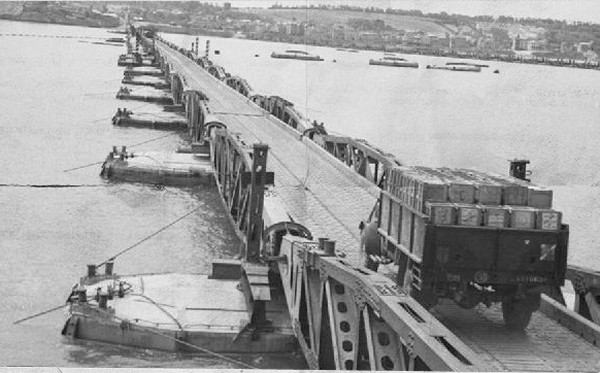 |
 |
Leonard Dawe,
Crossword Editor
The June 1st publication of
the NEPTUNE clue... codename for the
amphibious assault phase... was the call to action.
Alarm bells rang at MI5.
At this point eight different
codenames had appeared in the London Daily Telegraph
within a 45-day stretch. Those in the know
realized that D-Day was imminent. Was someone
tipping off the Germans just like the DIEPPE
situation? Were the Allies headed directly
into a trap?
Given the context of the
DIEPPE suspicions, the order came from MI5 to
interrogate the man who created the Telegraph
puzzles. So who
was the suspect? His name was
Leonard Dawe.
Leonard Dawe was the Telegraph
crossword compiler and creator of the puzzles in
question. Dawe was an
unlikely suspect for several reasons. To begin
with, Dawe had been
setting the newspaper crossword since its inception
in 1925. Even more
peculiar, Leonard
Dawe was headmaster of the Strand School, a
prestigious
private grammar school in London
for boys. Leonard Dawe was a highly respected man.
Still, one never knows what a
person's private political sympathies are.
Perhaps Dawe was a secret admirer of Hitler. Since Dawe
supplied the crossword content published by the Telegraph,
he was in position to use an improbable yet highly devious way
to pass on tips to the enemy.
|
On June 2, just four days prior
to D-Day, two
agents from MI5 called on
Dawe at his
school in
Effingham, a suburb of
London located southwest of the city.
Ordinarily the
Strand School was located in the center of
London. However the school was
not
located in London during
the war. Thanks to
the constant German
bombing of London, the Strand
School
had been evacuated for safety purposes from Tulse
Hill in South London to Effingham in Surrey,
a region located in southeast England.
Effingham was a countryside village that lay just 30
miles north of Brighton on the southernmost coast of England.
As it turned out, Brighton would
be one of the launch sites on D-Day. The two
agents noted the proximity and raised an eyebrow.
Was there a connection? After the agents
entered Dawe's
office, what they told Leonard Dawe left him terrified.
Dawe was
suspected of leaking sensitive information to the
enemy. Now the
MI5 officers demanded to know why he had hidden these
sensitive words within his crossword solutions.
Dawe was flabbergasted.
He replied he had no idea what they were talking
about. In fact, Dawe denied any knowledge
whatsoever. The agents were not happy to
find Dawe was totally unable to supply a reasonable answer
on the spot. That wasn't what the agents
wanted to hear. So with D-Day just four days
away, Dawe was arrested. Dawe was
unceremoniously bundled up and shoved into a waiting
car to be whisked to MI5 headquarters. All the
boys of the Strand School lined up to watch in horror.
During an
interview many years later, Tom Weston, the head boy
at the Strand School in 1944, was asked about the day MI5
arrived. Weston nodded and said he remembered the incident
quite clearly.
|
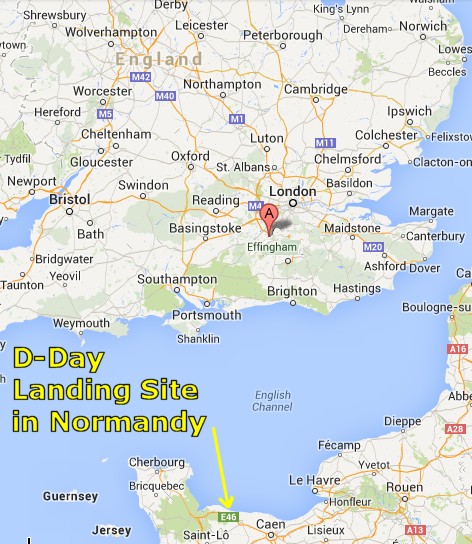 |
Tom Weston had
been told Mr. Dawe had been setting the
London newspaper crossword
since its inception in 1925. That
was a distant 20 years ago. Now that Dawe was
well into his
50s, he was still doing the crossword. However, to
Tom Weston, Mr. Dawe was not just
some teacher who dabbled in puzzles. Mr. Dawe was the
Headmaster of his
very proper private school!
When the news that two very
angry-appearing men were in Mr. Dawe's office first broke,
the whispers spread through the school like wildfire.
It wasn't just the boys who were alarmed, so were the
instructors. So naturally
everyone in the school paid
close attention as the
Headmaster was unceremoniously placed
into a car by those very serious-looking men
and whisked away.
“An official
car turned up in our driveway.
I was very
interested, especially after two very large men got
out. So I kept watching. After a time, I saw Mr. Dawe
go off in the car with whoever it was.
Each man had
one of his arms in a tight grip.
Afterwards the rumors started to fly.
When the boys
heard what the scandal might be about,
we were
appalled. We were astonished at the thought that
Mr. Dawe
was a traitor. He was
not just our headmaster, he was a member
of the local golf club and widely
respected. Whatever
was going on, it was a complete mystery to
all of us.”
- - Tom Weston
|
The
Interrogation
of Leonard Dawe
Leonard Dawe was in serious trouble.
He would be held in custody for several days for further
interrogation. As a precaution, the daily
crossword puzzle in the Telegraph was suspended just
in case "DDAY" was set to appear in the next
issue.
The interrogators were well aware that
Dawe was an unlikely suspect. Here was a
kindly old man in his 50s who was head of a posh, gentile
English private
school. Still, you never know. Given the seriousness of the situation, no doubt the
interrogation was rigorous and quite unforgiving.
Oh, to be a fly
on the wall! We will never
know, but one has to wonder just how far
MI5 went to “break
him”. After all, nothing could be
left to chance. If war secrets were being passed
along, especially with so many lives at stake, Dawe's code
words could spell absolute doom for the invasion.
Fortunately for Dawe, the Normandy
invasion was successful. Otherwise he might not have
ever left confinement. However, Dawe
was allowed to return to the
school a few days later. Upon his return, Dawe
said nothing and did little
to dispel the mystery surrounding him.
Dawe adamantly refused to offer any sort of explanation.
It was likely that MI5 had ordered him to keep his mouth
shut. But they did allow Leonard Dawe
to resume setting the
crosswords. As things returned to
normal, the boys
assumed nothing was wrong after all.
At this point, the schoolboys turned
their attention back to the dramatic events of war and forgot
about the
strange visit of the two men.
However, Leonard Dawe never forgot about it.
Years later,
during a BBC television interview in 1958, Dawe referred to
the incident, saying:
"They turned me inside out. Then
they went to Bury St. Edmunds where my senior colleague
Melville Jones (the Telegraph's other crossword compiler)
was living. They put him through the grill as well.
But in the end they eventually decided
not to shoot us after all.
Had D-Day failed,
I
suppose they might have
changed their minds."
- - Leonard Dawe
Dawe was correct. The failure of
the mission would have kept him jailed for further scrutiny on suspicion of leaking
sensitive information to the enemy.
The appearance of
8 different code names was ridiculous, especially in such a
short period of time and at such a critical time.
All of those clues are outrageously rare.
For that matter, given that the
DIEPPE Codeword had also appeared
in the crossword puzzle, they had
every right to hang Dawe or just shoot him outright.
After all, the odds that these 8
clues were a
mere coincidence was astronomically
unlikely. Something was wrong here, very wrong.
The appearance of those words could NOT BE AN ACCIDENT!
So is this end of the story?
No.
|
The Mystery Begins to Unfold, Part One
|
Rick Archer's Note:
As it turned out,
in 1984 the
secret was finally revealed. 1944
to 1984. That’s right,
it
took 40 years for the remarkable
explanation to finally emerge.
The answer was absolutely
preposterous, but in retrospect it made complete
sense.
|
Ronald
French
In 1984, the
Daily Telegraph decided to celebrate the 40th
anniversary of D-Day by re-telling
the strange story of the 8 code names that appeared in their
crossword puzzles during the fateful period shortly before
D-Day. To this point, no explanation had ever surfaced.
One of the
readers was Ronald French, 54, a property manager in
Wolverhampton located about 150 miles northwest of London.
The man's eyes bulged when he read the
story. Ronald French
immediately contacted the Telegraph with an astounding confession.
French
confessed he
had inadvertently been the source of the leaks!!
The Daily Telegraph wasted no time
sending a reporter over to get the full story. Ronald
French explained
that he was 14 years old when he attended the Strand School
in 1944. French had been the
one who handed Leonard Dawe the
code words that appeared in the London Daily Telegraph.
French then told an alarming story about the day his
Headmaster made him feel like the British Benedict Arnold.
One
afternoon
shortly after D-Day, Headmaster Dawe called for French to come to his
office.
Here
is what Ronald French had to say about the encounter.
|
|
|
"Soon after D-Day, Dawe sent for me
and asked me point blank where I
had gotten those words from. I told him all I knew.
Then he
asked to see my notebooks.
When he opened them,
Dawe was horrified. Dawe
screamed at me and said
that my books must be burnt at once.
I have never seen anyone so angry in
my life. I was really scared,
terrified of imprisonment.
Mr. Dawe gave me a stern lecture about
national security and made me swear that I would tell no one
about the matter. He was very insistent on total secrecy.
He made me swear on the Bible I would
tell no one about it. I have kept to that oath until now
(1984).”
-- Ronald
French
|
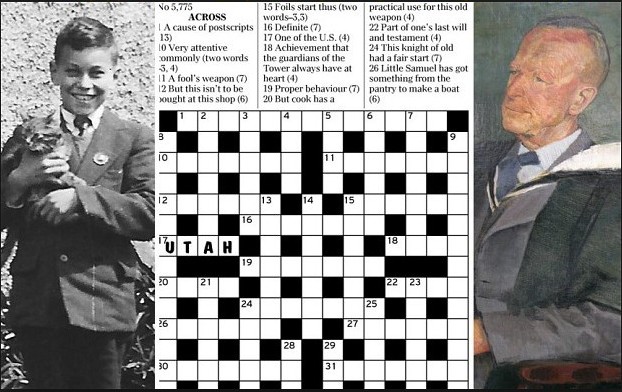 |
|
|
Once Mr. Dawe told
the young Ronald
French to keep quiet, he
did just that.
French didn't tell his friends or parents
anything. Instead French kept the
secret to himself for 40 years. It
was very sad because Leonard Dawe had made this hapless boy believe he had nearly caused England to lose the war.
French could still recall the harsh words... "You nearly
cost countless lives with your foolishness!"
So how did
Ronald French
manage to get his code words into the daily crossword
puzzle? French explained that Mr. Dawe
took his crossword
work for the London Daily
Telegraph very seriously.
Then he added that Mr. Dawe loved trying to get
his students interested in crosswords.
In fact,
Ronald French noted that Mr. Dawe had a
special technique he used to stir up interest in crosswords.
According to
French, Dawe would occasionally invite pupils into his
study. During these times, as a mental
exercise, Dawe
would encourage his students to help
each other fill in blank crossword
patterns. There were no riddles involved.
The
students were asked to create an answer sheet for a
crossword puzzle
without having to worry about setting the clues. All
they had to do was create the answer sheet from scratch.
Mr. Dawe said a student like Ronald French
could put in any word that fit
his
fancy in the long spaces. Once the
long clues were in place, the
student could then agonize
over ways to find words that could connect the longer
clues and fill out the entire grid.
Ronald French said he kept a notebook of interesting
words and frequently added these words as his
contribution.
The bottom line was that Leonard
Dawe had gotten tired of doing the daily crossword
puzzle on his own. Making a puzzle once a week was
one thing, but the demand to create a new puzzle every
day and also run the Strand School was beyond his energy
level. So Dawe devised an devious plan... why not
coax the boys to do some of the work for him?
Leonard Dawe should have been
ashamed of himself. Implying the boy was a
traitor,
Dawe blamed the problem on Ronald French when in reality it was his own mistake that jeopardized the invasion.
Furthermore, losing his temper at
the young man was intolerable.
Dawe
deliberately scared the
boy to death in
a desperate attempt
to protect his
job.
French had done nothing wrong, certainly nothing to deserve
being screamed at and made to feel guilty. French was
guilty of nothing more than doing what Dawe had
asked him to do. He had written down meaningless words into his notebook,
then recited them to complete Dawe's crossword exercise.
For his efforts, Dawe took out his anger on the helpless 14-year old
boy.
As French explained to the
reporter, the Headmaster's threats forced him to live in shame for 40 years with the
thought that he had almost lost World War II. Can you
imagine the burden of that thought? "Oh my God,
thanks to me, Hitler almost won the war!"
Ronald French went on to say that
Dawe had never explained to the 14-year
old boy what French had done wrong. French had no idea that Dawe was using
the boy's answer sheets for his own purpose.
Nor did he have any idea his
secret code words were appearing in
a newspaper. All French knew was that he had done something
wrong, but he didn’t know what it was and
that he was ordered not to tell his parents.
Not one whisper!! French believed he would be
locked up and never seen again. With the vision of
going to jail for life, Dawe's threats were effective.
For the next 40 years, Ronald French never uttered a
word.
It
was the silence of Ronald French that saved Dawe’s job.
MI5 had Dawe's confession, but the Strand School had no
idea what the truth was. Once Dawe realized he had unwittingly
published extremely sensitive information,
he
knew full well how much
trouble he would be in if this secret ever got out to
the school officials or to the
Daily Telegraph. Dawe
had no business asking his schoolboys to do his crossword
puzzle work for him and Dawe knew it. If someone ever
found out the truth, Dawe would surely have been sacked.
The silence of Ronald French is what saved his job.
Too bad Dawe didn't lose both
jobs, crossword editor and headmaster. He
certainly deserved it. Instead Dawe went on the BBC in
1958 and played the misunderstood victim. When Dawe
passed away in 1963, this coward carried his secret to
the grave.
|
The Mystery Unfolds, Part
Two
|
When Ronald French finally learned the
truth in
1984, he was
incredibly relieved. For the
first time, French finally understood what had been
going on. For him, the 1984 Daily Telegraph
story put the entire strange affair into perspective.
Ronald French and the other
teenagers did not know that Leonard
Dawe was using their
hard work and creativity to create
puzzles he was being paid to create himself!
Unbeknownst to
the boys, Dawe would take the best answer sheets and create the
clue questions
on his own. In other words, the kids created
the grid, the difficult part, and
then Dawe
took care of the questions himself. Then he
would secretly publish their work.
Okay, so that’s
one part of the explanation for the bizarre code name
mystery. But where
did the eight code names come
from?
Perhaps you have already guessed
the answer, but I will share it with you anyway.
Using the map below, note the proximity of
Effingham to the Brighton
departure point. In a nutshell, there were many
fighting men stationed within walking distance of the
Strand School relocated into Effingham. These
soldiers were heroes to the young boys. In turn,
these brave young men enjoyed the idol worship of the
schoolboys. It was natural for them to adopt the
boys as their young friends.
|
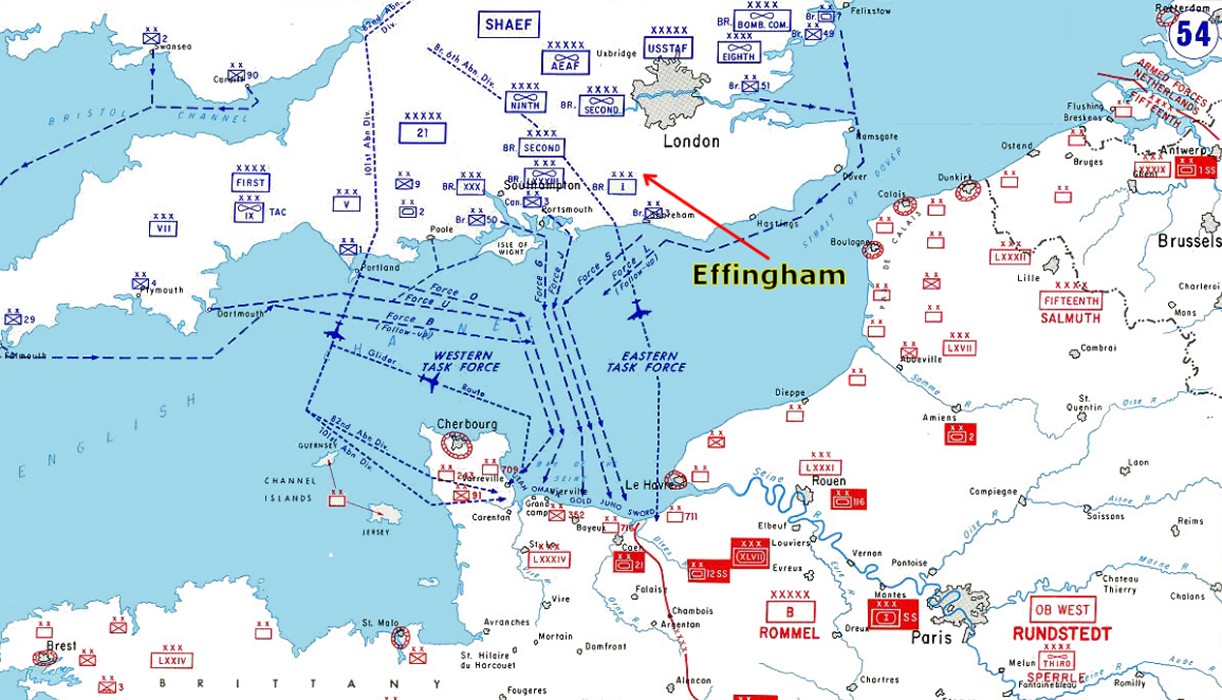
After Ronald French
explained that he
was responsible for
inserting
the code names into the crossword
puzzles himself, the
reporter asked French how he knew the
code names.
French
replied that during the
weeks shortly before D-Day, he had learned of the code
words from Canadian and American soldiers camped
close to his school. These, of course, were men
stationed nearby to await
their part in the invasion.
“The soldiers were obviously
lonely,” recalled French.
“Many of the men had children of their own, and they
more or less adopted us. We’d sit and chat and
they’d give us chocolate. We
would ask them a million questions.”
It was
during conversations like these that Ronald French
heard the code words. Security
was remarkably lax. Since
the boy had struck up close
friendships with the soldiers,
they saw no reason to guard their words.
French, 14, became a real
favorite of the men. French
was trusted with the task to take the
colonel’s dog for daily regular walks.
As a reward, on one occasion, the soldiers even let
the boy drive a tank by himself for fun.
|
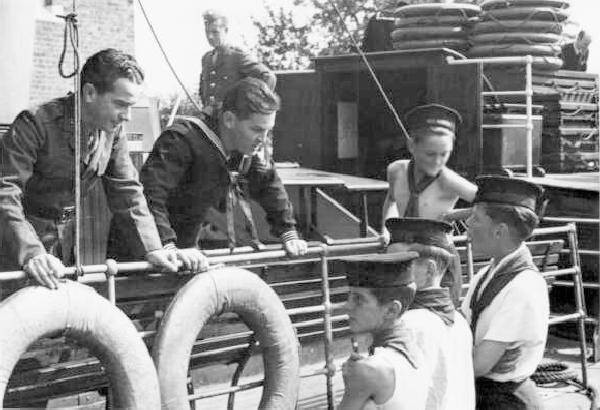 |
French said the men took him under
their wing and showered
him with attention. He absolutely loved it! This was a
perfectly understandable match. French and
the other boys at the nearby Strand School were the perfect age for
hero worship. In turn, the lonely men loved the chance to befriend
their young admirers during these anxious days far from
home.
"I was totally obsessed about the
whole thing. I would play truant from school to visit the
camp. I used to spend evenings with them and even whole
weekends there, dressed in my Army cadet uniform.
I became a
sort of errand boy who walked the dog about the place and
did small chores like fetch cigarettes and stuff like that.
Everyone knew the outline invasion
plan and they knew the code words.
Omaha and Utah
were the beaches, and these men knew the names but not the
locations. We all knew the nickname for the operation was
Overlord.”
The soldiers talked freely in front of
me because I was quite obviously
not a German spy. I wasn’t the only one. Hundreds of kids
must have known what I knew."
- - Ronald French
Ronald French was
adamant that the secret code words were well known
not just by him, but by all the
boys. He also pointed out this knowledge was
harmless without any idea 'when' and 'where' the invasion
would strike. French said he had no idea what the significance of those
code names was. Everyone plus the dog and
the cat knew the
big landing was going to take place soon,
but French still had no idea the men were headed.
The location remained a
secret for the simple reason that the
soldiers did not know the location either!
In that sense, neither the soldiers
nor the boys knew anything more than the Germans
did.
And that was the whole idea.
By using code words rather than call the landing site 'Normandy
Beach', the secret stayed safe.
Without a doubt,
the terrible war and the proximity of the Allied soldiers
was exciting for the schoolboys. Ronald French, for
example, said he kept notebooks of
the information he
gleaned. With the war at its height, the excitable teenager
was obsessed by the vocabulary of the era. Any time he
heard an interesting word, French wrote it down.
French had another reason to
write down words... he wanted to please his headmaster.
Indeed, Headmaster Leonard
Dawe was
directly responsible for French's
fascination with his
vocabulary notebook. Crossword puzzles
demand an extensive vocabulary to help with the difficult
creation process. It is hard to imagine a
14-year old boy with a vocabulary extensive enough to fill
in
the blanks for an entire crossword puzzle.
Ronald French likely began writing
down words as a way to help him with
his difficult crossword puzzle task.
Ronald
French inserted all sorts of
war-time words into his notebook such as “RAF” (Royal Air Force),
“warden”, “Poland”, “aircraft”, “ammo”
and “disarm” in addition to the code names.
French had no idea the sensitive nature of the words
he added such as “Juno”, “Omaha”,
and “Overlord”.
To him, they were simply useful words to
help him complete Mr. Dawe's crossword assignments.
French was
totally naïve about what he was doing. In fact, when asked
by the newspaper 40 years later, French said he did not
remember actually inserting the codenames into the puzzle
grids. To him, they were just words.
Since he had no idea what their significance was, he
added those words without
a second thought.
|
FOOTNOTE ON 'DIEPPE'
Rick Archer's Note:
Following his 1984 ‘confession’, Ronald French
regained his youthful enthusiasm for crossword puzzles. Once
the guilt was released, from this point on
French began to complete the
Telegraph’s crossword every day.
However, one
riddle remains.
Two years
prior to the D-Day affair, on 17 August 1942, “DIEPPE”
was part of the paper’s crossword
puzzle. Two days later, a
disastrous raid took place on the port, with 3,623 of the
6,086 men who made it ashore killed, wounded or captured.
It was a terrible tragedy.
At the time,
the
War Office investigation concluded the incident was “a
remarkable coincidence, a fluke”.
Given what we
know about the Ronald French episode,
more than likely Dawe's
little game was the reason
'Dieppe'
had appeared in 1942.
Whether the clue accidentally tipped
the Germans off, we will never know. But the
Germans were definitely there waiting for the attack, so
one has to wonder. Stop and think about it... the
word 'Omaha' is a meaningless code word. On
the other hand, the word 'Dieppe' is
not code,
it is a definite location.
Did this peculiar
crossword puzzle clue tip off the Germans? We will
never know, but it certainly makes a person wonder.
British propaganda posters had warned for years that the
enemy lurked within, but the security service never
dreamt that the Crossword puzzle page of the Telegraph could
be a haven for subversives. The
greatest blame for "Dieppe" was the
failure of the military to use a code word.
Loose lips sink ships, loose
clues cause D-Day blues.
Thank goodness someone had the sense to use code words
for D-Day.
Thank you for
reading the Code Word Mystery!
Rick Archer
LETTER ONE
-----Original Message-----
From: Michael Davis
Sent: Thursday, February 28, 2019 3:10 PM
To: Rick Archer
Subject: D-Day & Dieppe
Wow! Very
interesting story. And I
am not even a history buff. But
I speculate that there is more to
this story.
Firstly,
I give a part of the blame to Leonard, and much of it to
the soldiers stationed there, & none to Ronald.
Ronald
should have known the words could be sensitive, but was
too young to know. The reason nothing came of it was
that the Germans may not have known the meanings of the
code words, Omaha, Utah, etc.
However,
two years earlier, Dieppe was a different story. Not a
code word!!!
Probably
the word got into the puzzle by the same means, but
“Dieppe” required no translation! Of course, Ronald may
not have supplied this words. Could have been another
student who was “trusted by the allies”. Ultimately a
lot of the blame goes not to Ronald, not even to
Leonard, but to the foolish loose-lipped allied
soldiers. And the greatest blame for “Dieppe” was the
failure of the military to use a code word.
LETTER TWO
From: Mark
Barton
Sent: Wednesday, June 5, 2019 5:16 AM
To: dance@ssqq.com
Subject: Leonard Dawes and D Day crossword
Hi Rick,
I read with interest your take on the Telegraph
crossword incident because 1) we're approaching the
anniversary and 2) I went to the Strand school
albeit many years later in the early 70's.
The answers given seem to leave a lot of unanswered
questions. For example, why would Dawes choose
those particular words in close proximity when I'm
sure there were plenty of other options from the
pupils.
There was an article in the Guardian newspaper some
years ago about a school trip by Strand schoolboys
to Bavaria in 1936. The schoolmaster took a
dozen or so schoolboys out in bad weather and
several lost their lives.
The
local villagers managed to get some of them to
safety and the ones who died had a guard of honour
by Hitler Youth in a local church. Adolf
Hitler took a personal interest and the bodies were
taken by train back to England paid by the German
government.
Was some connection made at this point between Dawes
and Germany or was it already in place hence the
trip??
With
regards to Dieppe I wasn't even aware of that till I
read your article. Too many coincidences I
think. I don't like coincidences.
If you haven't read it already, if you Google 'Guardian
1936 Strand Bavaria' there is a large
article from the
Guardian.
Seems a strange choice for a school trip to Germany
in 1936?
Best
regards
Mark Barton
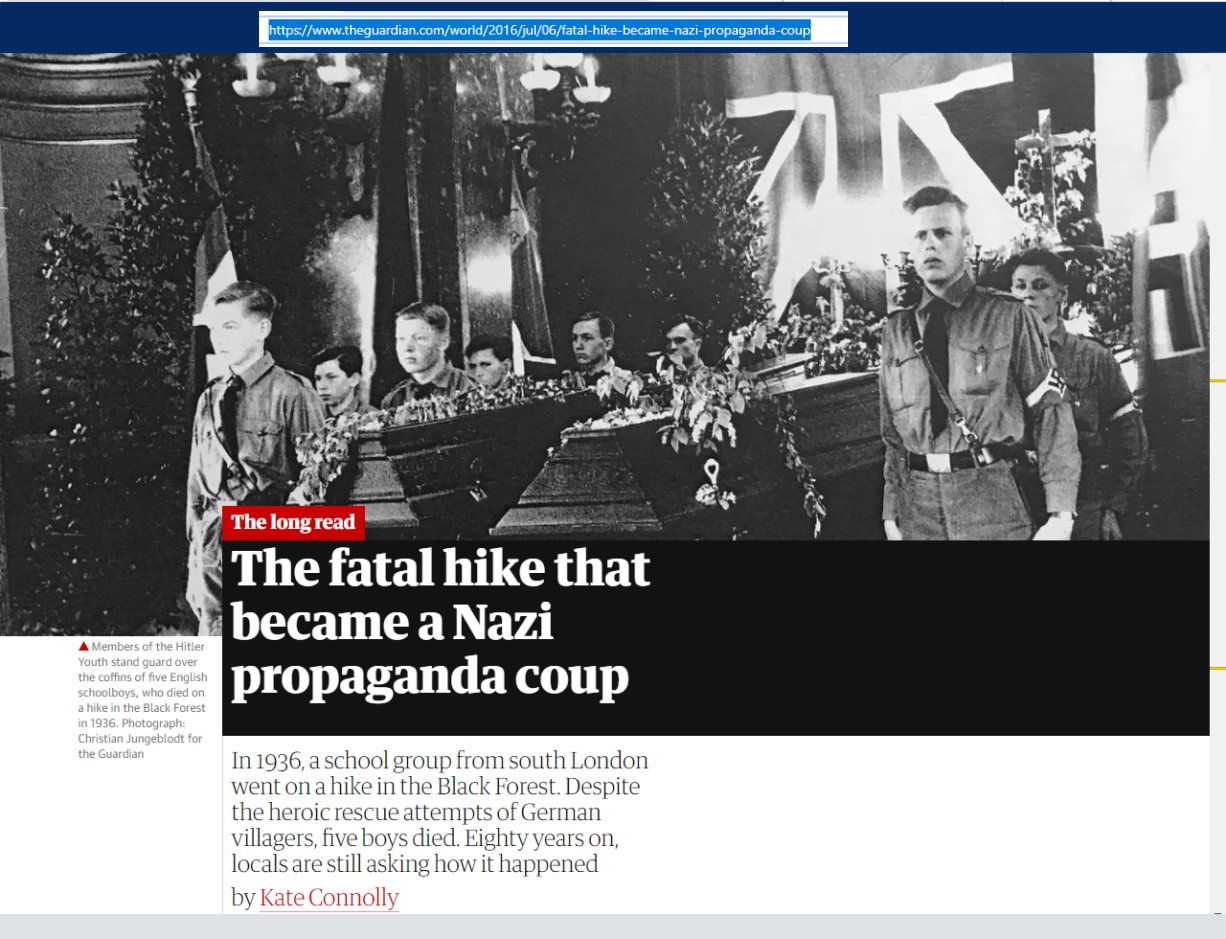
|
|
|